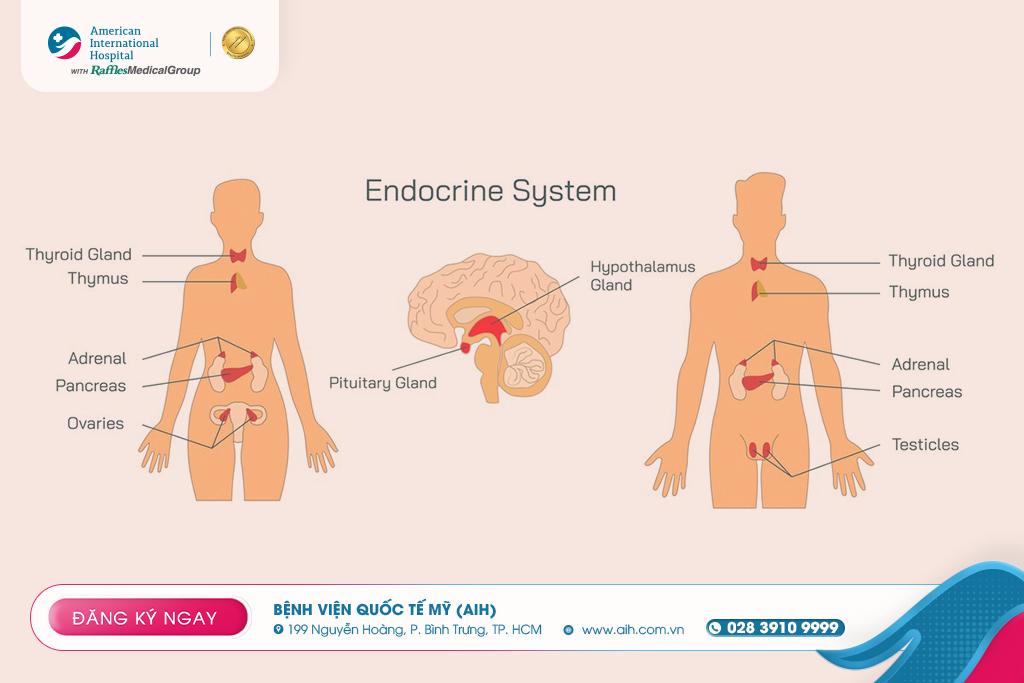Notification
Please fill in the information below
Urgent
THE IMPACT OF STRESS ON THE ENDOCRINE SYSTEM AND WHAT YOU NEED TO KNOW
In modern life, stress has become an almost constant “companion” for everyone. Few people know that beyond feelings of anxiety, tension, and fatigue, stress also has profound effects on the endocrine system – the hormone network responsible for regulating the body’s overall balance. Managing stress not only improves mental well-being but also protects endocrine health, thereby preventing many chronic conditions.
Stress and the endocrine system: A complex connection
The endocrine system is a collection of glands and hormones involved in regulating nearly all life activities: metabolism, growth, reproduction, sleep, and responses to the environment. When the body faces stress, an immediate “cascade of endocrine reactions” is triggered.
The endocrine system plays a central role in the stress response, helping the body adapt to injury, psychological pressure, or environmental changes. The core of this response is the HPA axis (Hypothalamus – Pituitary – Adrenal), in which:
The hypothalamus secretes CRH, initiating the signal that stimulates the pituitary gland.
The pituitary gland releases ACTH, which stimulates the adrenal glands to produce cortisol.
The adrenal glands will secrete more cortisol – the primary hormone of the stress response, helping the body cope with tension.
At the same time, the sympathetic nervous system activates the adrenal medulla to release adrenaline and noradrenaline, putting the body into a “fight or flight” state.

When stress becomes chronic
If it occurs only short term, the stress response helps enhance coping ability. But as research shows, prolonged stress disrupts the HPA axis, causing the body to secrete excessive or dysregulated cortisol. The result is a series of endocrine disturbances:
1. Metabolic dysfunction
Elevated cortisol increases blood glucose and reduces insulin sensitivity.
Increased risk of insulin resistance, abdominal obesity, metabolic syndrome, and type 2 diabetes.
Stress causes blood glucose to fluctuate unpredictably, making diabetes more difficult.
2. Reproductive effects
In women: ovulation suppression, menstrual irregularities, reduced fertility.
In men: decreased testosterone, reduced sperm count and quality, decreased libido.
This is why chronic stress is often associated with infertility and subfertility.
3. Effects on the thyroid
Prolonged cortisol reduces thyroid activity, causing fatigue, weight gain, and metabolic disturbances.
4. Immune suppression
Cortisol helps reduce inflammation in the short term, but when prolonged, it weakens the immune system, increases susceptibility to infections, and may even worsen autoimmune diseases.
5. Effects on mental and neurological health
HPA axis dysregulation is associated with anxiety, depression, and sleep disorders – common “comorbidities” of chronic stress.

Solutions to balance stress and protect the endocrine system
Experts agree that to maintain stable endocrine function, proactive stress management is essential. Some recommended measures include:
Meditation, deep breathing, yoga: reduce cortisol and improve neuro-endocrine balance.
Regular exercise: helps control weight, stabilize blood glucose, and increase endorphins.
Adequate sleep: quality sleep is essential for proper HPA axis function.
Balanced nutrition: limit sugar and refined starches; increase intake of leafy greens, omega-3s, and antioxidant-rich foods.
Medical consultation: when signs of endocrine imbalance occur (menstrual disorders, unexplained weight gain, fatigue, prolonged insomnia, difficult-to-control blood glucose), an endocrinology evaluation is needed for hormone assessment and timely intervention.
Stress is not only a psychological feeling but also a “biological challenge” that directly affects the endocrine system. Stress clearly has multidimensional impacts: from HPA axis mechanisms and hormonal disturbances to real-world complications in patients with diabetes, reproductive disorders, and immune dysfunction.
Effective stress management is the key to protecting endocrine health, keeping the body in balance, and preventing many dangerous diseases in the future.

When should you see an endocrinologist?
Stress may be a normal bodily response to pressure. However, if prolonged tension occurs along with the following abnormal signs, you should seek early evaluation at an Endocrinology clinic or a combined Psychology–Endocrinology service:
Prolonged sleep disturbances: insomnia, difficulty falling asleep, frequent nighttime awakenings.
Unexplained weight changes: weight gain or loss despite no change in diet.
Chronic fatigue symptoms: sluggishness, exhaustion, no improvement even with rest.
Menstrual irregularities in women or reduced testosterone in men.
Rapid heartbeat, hand tremors, excessive sweating, easily mistaken for hyperthyroidism or other hormonal disorders.
High blood pressure, abnormal blood glucose fluctuations, especially in people with underlying cardiovascular disease or diabetes.
Anxiety, depression, extreme mood swings affecting work and quality of life.
Early evaluation helps doctors conduct a comprehensive assessment: measuring cortisol, thyroid hormones, sex hormones… and developing an appropriate treatment plan to prevent long-term complications of stress-induced endocrine disorders.

Effective ways to manage stress
1. Refresh the mind
Practice mindfulness, deep breathing, and relaxation techniques.
Take short breaks to clear your mind and improve your mood.
2. Recharge the body
Get adequate sleep to restore physical energy.
Exercise regularly to relieve muscle tension and improve health.
3. Organize a healthy routine
Manage time efficiently and maintain good habits: blood glucose control, taking medications as prescribed, exercising, and balanced eating.
4. Connect for support
Join support groups or share with family, friends, or professionals.
Seek new perspectives and companionship to overcome stress.
Reference:
--------------------






































































Leave a comment